Data Science Manager Resume Examples

Jul 18, 2024
|
12 min read
Master the perfect algorithm for success: tips and tricks to create a compelling data science manager resume that will help you stand out and "debug" the competition.
Rated by 348 people
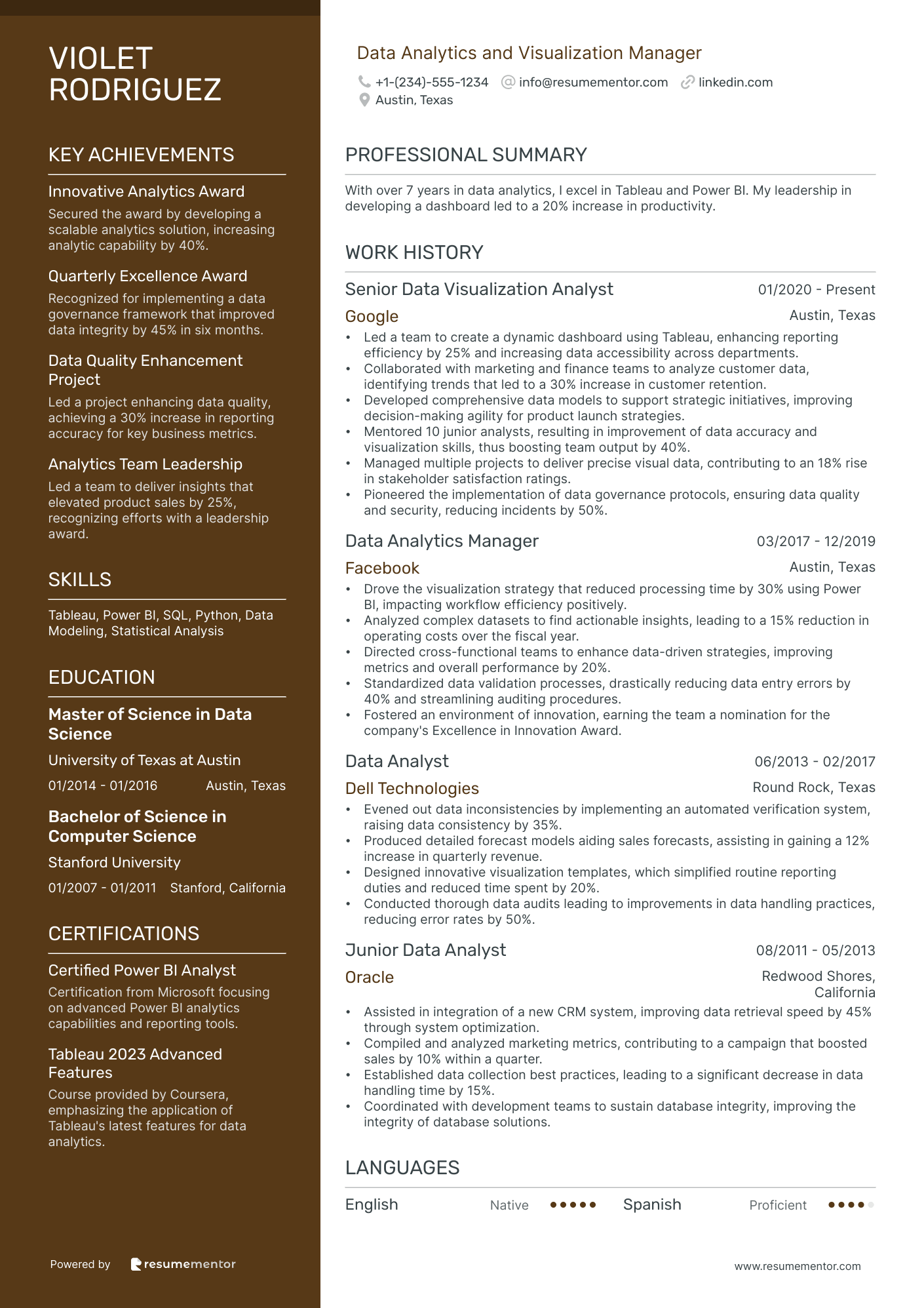
Data Analytics and Visualization Manager
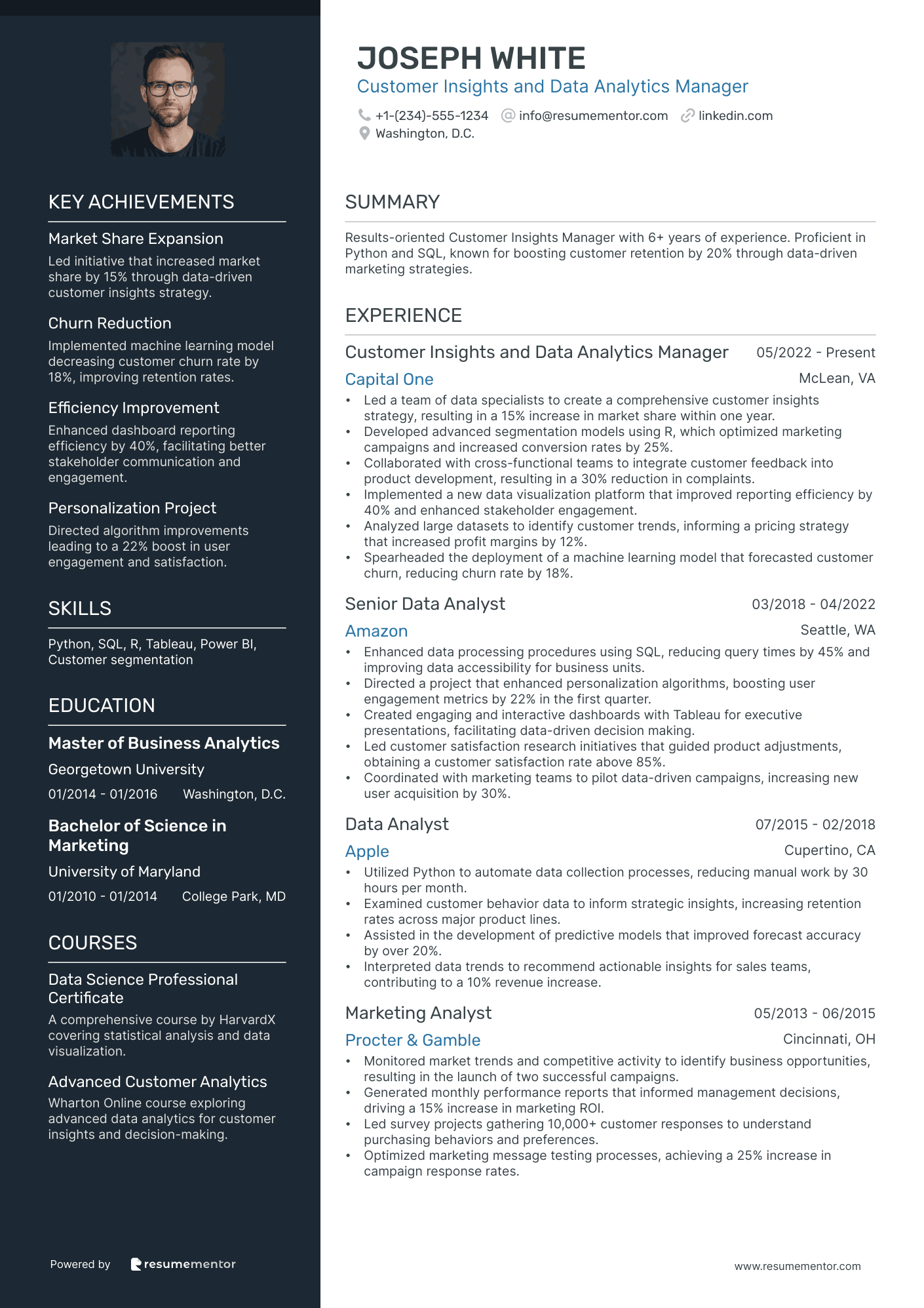
Customer Insights and Data Analytics Manager
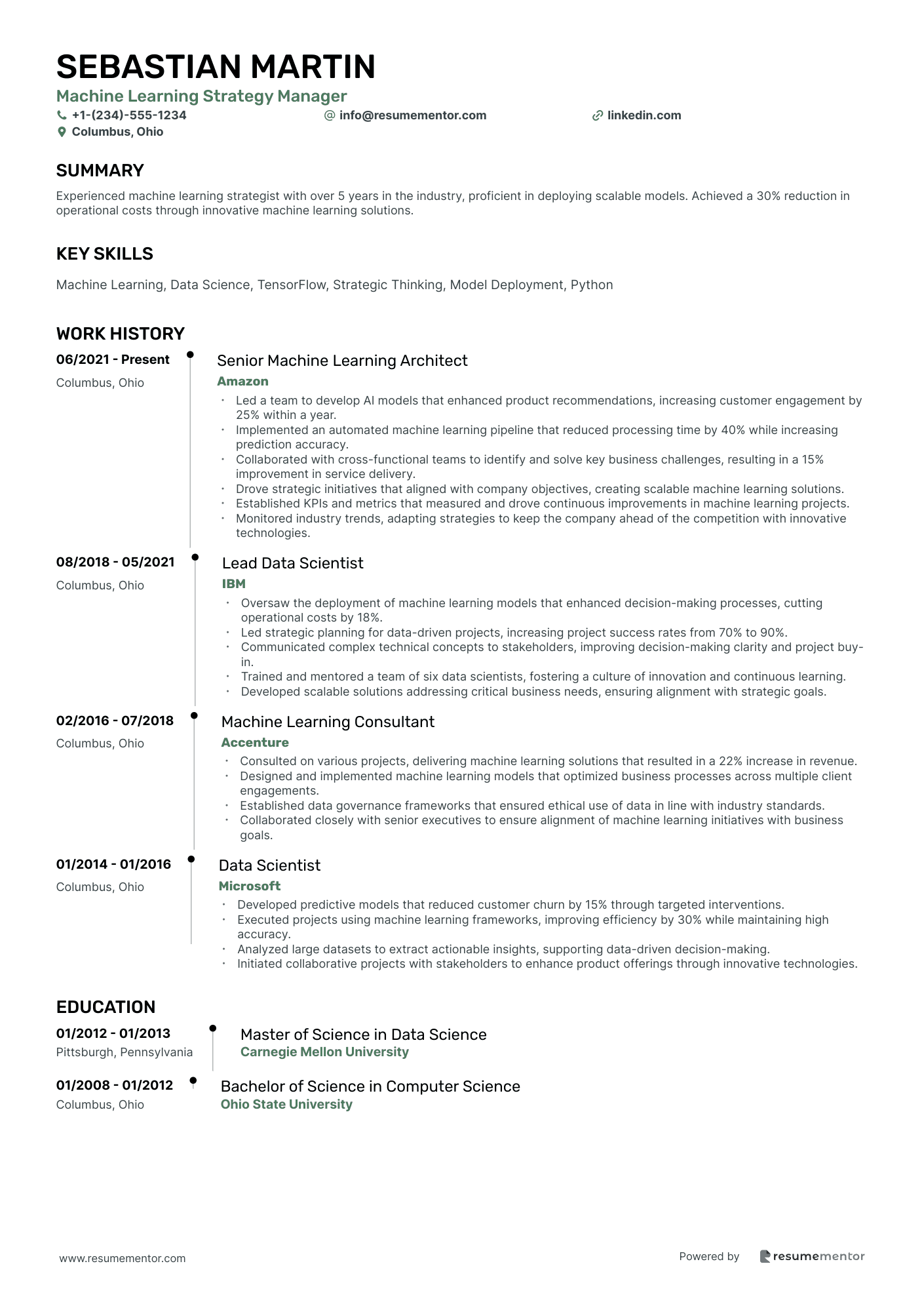
Machine Learning Strategy Manager
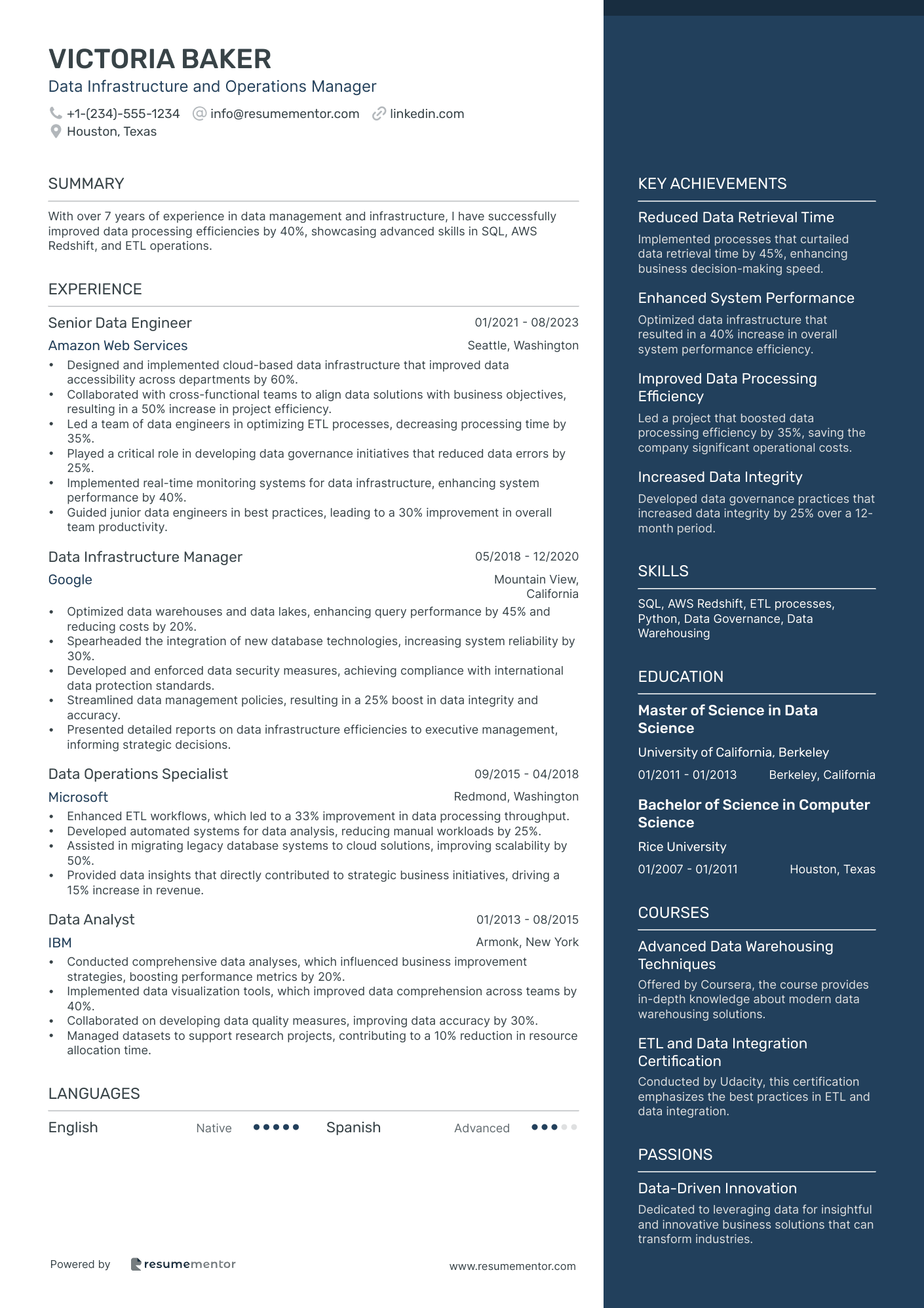
Data Infrastructure and Operations Manager
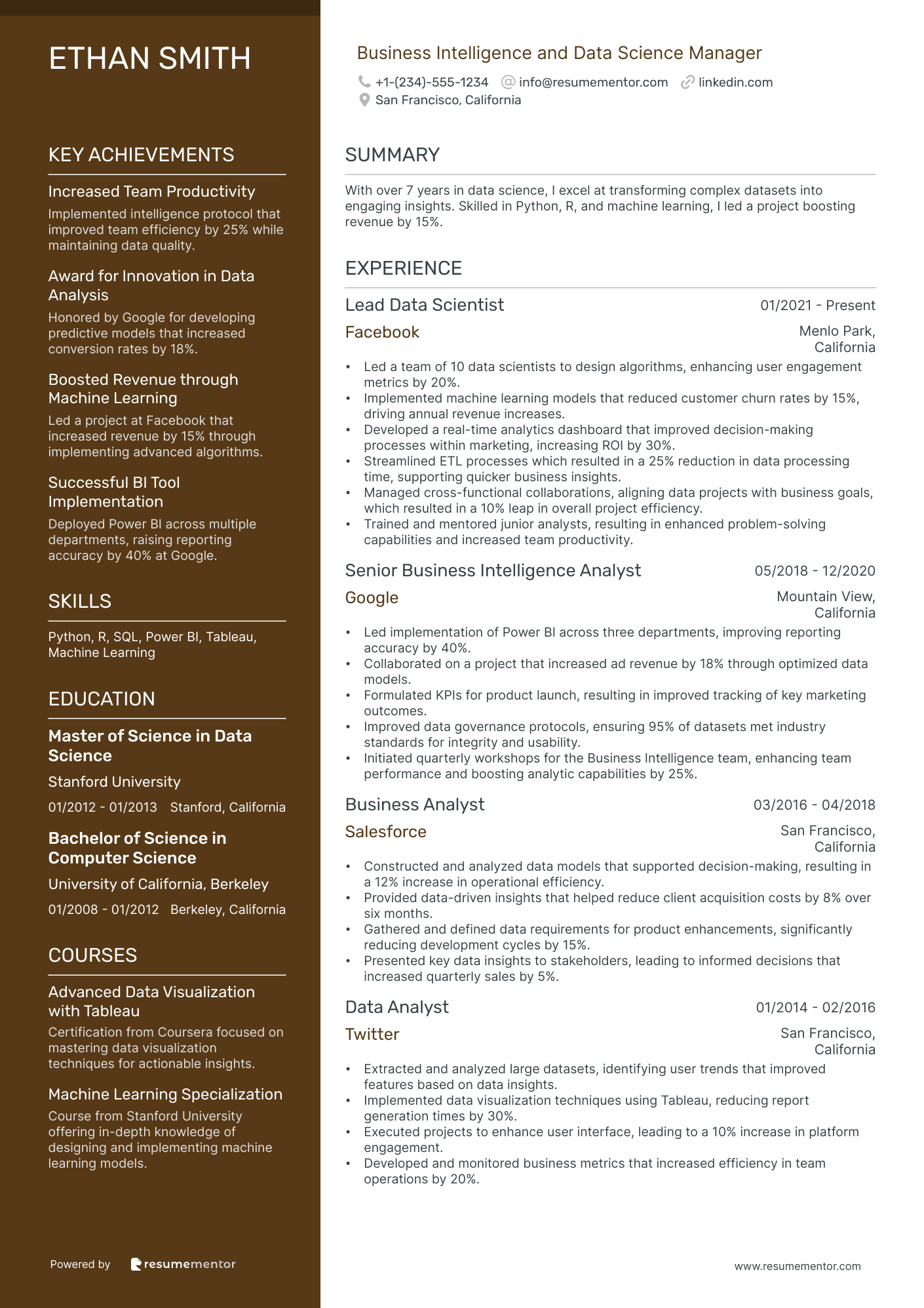
Business Intelligence and Data Science Manager
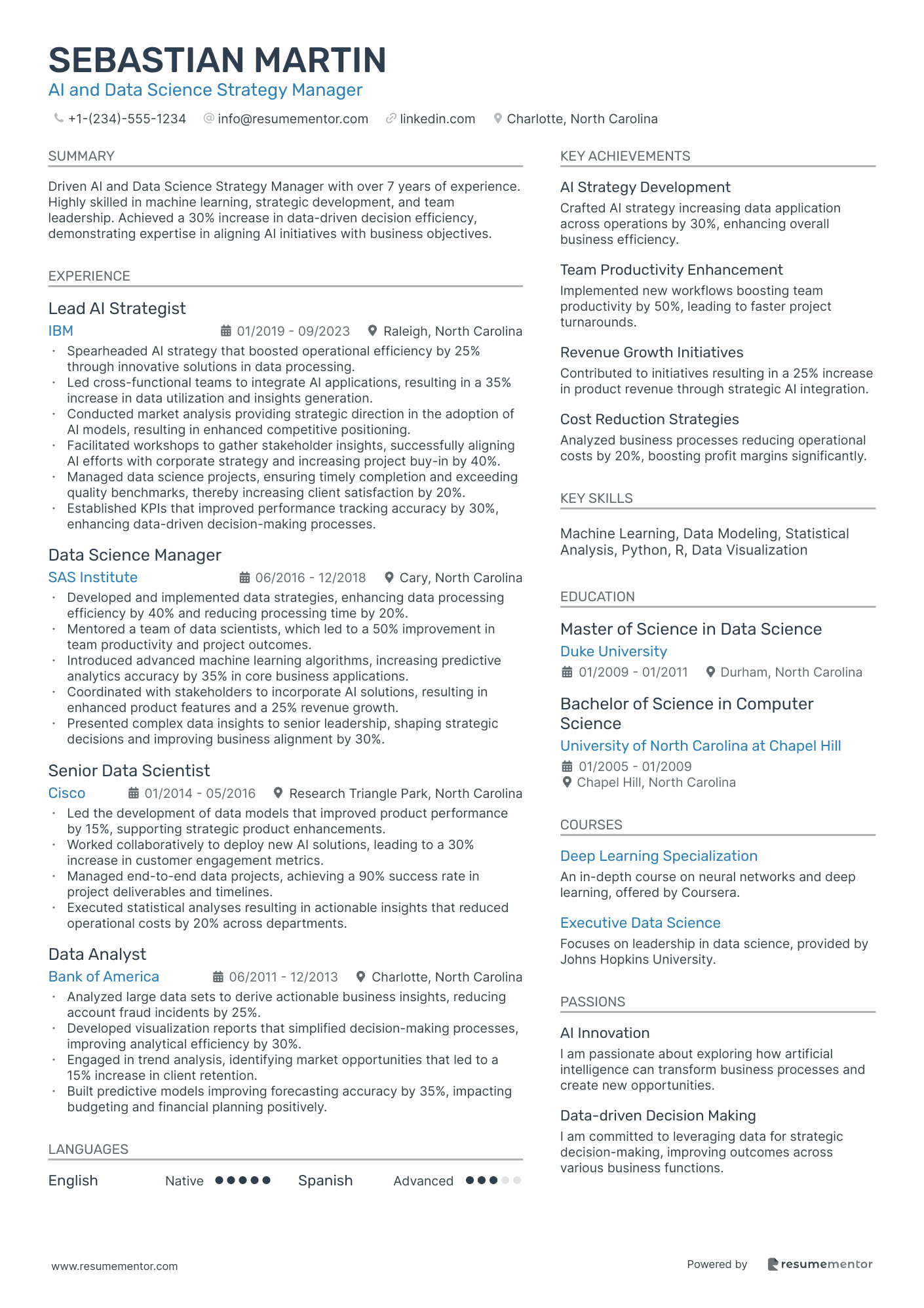
AI and Data Science Strategy Manager
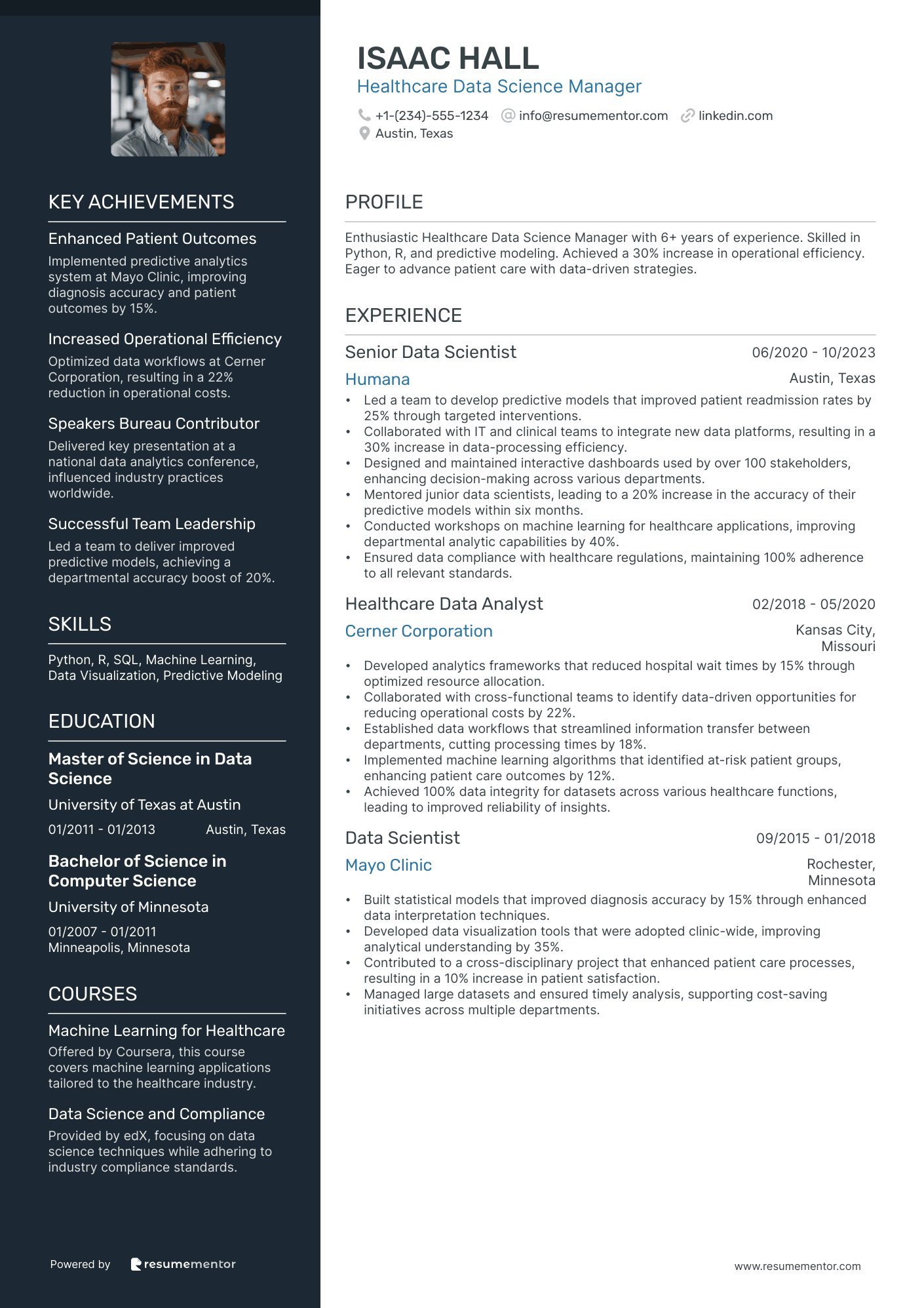
Healthcare Data Science Manager
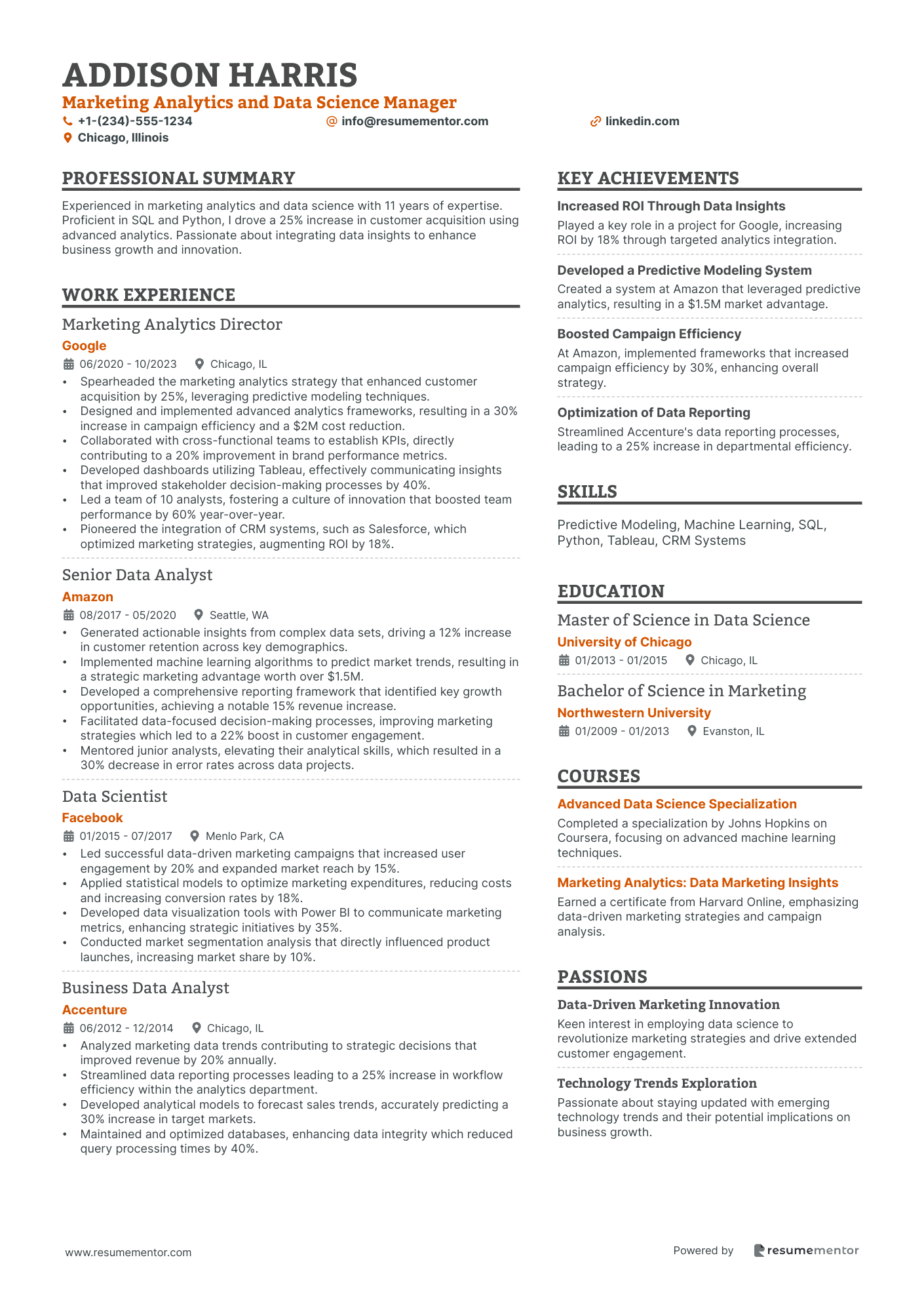
Marketing Analytics and Data Science Manager
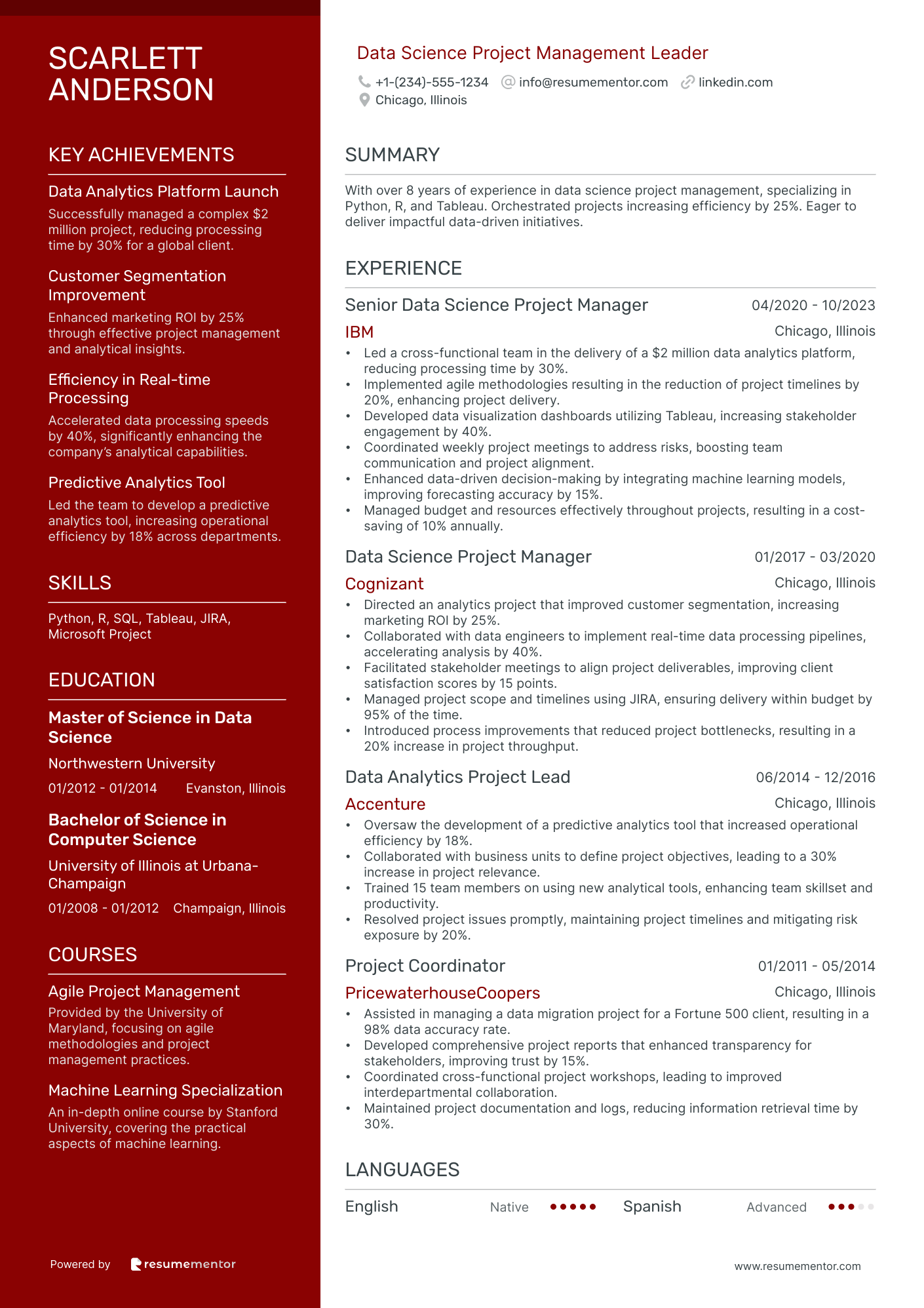
Data Science Project Management Leader
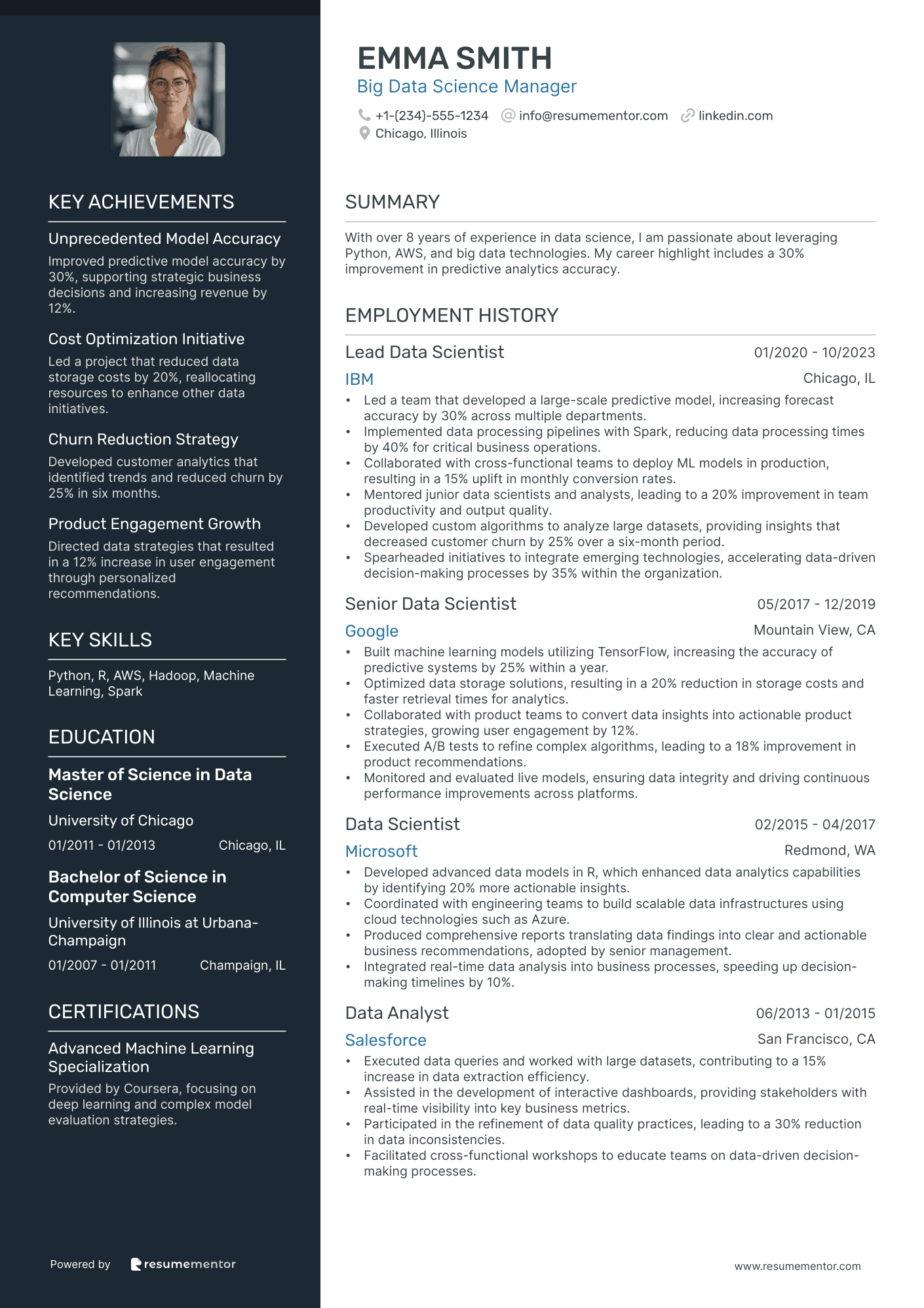
Big Data Science Manager

Data Analytics and Visualization Manager resume sample
- •Led a team to create a dynamic dashboard using Tableau, enhancing reporting efficiency by 25% and increasing data accessibility across departments.
- •Collaborated with marketing and finance teams to analyze customer data, identifying trends that led to a 30% increase in customer retention.
- •Developed comprehensive data models to support strategic initiatives, improving decision-making agility for product launch strategies.
- •Mentored 10 junior analysts, resulting in improvement of data accuracy and visualization skills, thus boosting team output by 40%.
- •Managed multiple projects to deliver precise visual data, contributing to an 18% rise in stakeholder satisfaction ratings.
- •Pioneered the implementation of data governance protocols, ensuring data quality and security, reducing incidents by 50%.
- •Drove the visualization strategy that reduced processing time by 30% using Power BI, impacting workflow efficiency positively.
- •Analyzed complex datasets to find actionable insights, leading to a 15% reduction in operating costs over the fiscal year.
- •Directed cross-functional teams to enhance data-driven strategies, improving metrics and overall performance by 20%.
- •Standardized data validation processes, drastically reducing data entry errors by 40% and streamlining auditing procedures.
- •Fostered an environment of innovation, earning the team a nomination for the company's Excellence in Innovation Award.
- •Evened out data inconsistencies by implementing an automated verification system, raising data consistency by 35%.
- •Produced detailed forecast models aiding sales forecasts, assisting in gaining a 12% increase in quarterly revenue.
- •Designed innovative visualization templates, which simplified routine reporting duties and reduced time spent by 20%.
- •Conducted thorough data audits leading to improvements in data handling practices, reducing error rates by 50%.
- •Assisted in integration of a new CRM system, improving data retrieval speed by 45% through system optimization.
- •Compiled and analyzed marketing metrics, contributing to a campaign that boosted sales by 10% within a quarter.
- •Established data collection best practices, leading to a significant decrease in data handling time by 15%.
- •Coordinated with development teams to sustain database integrity, improving the integrity of database solutions.
Customer Insights and Data Analytics Manager resume sample
- •Led a team of data specialists to create a comprehensive customer insights strategy, resulting in a 15% increase in market share within one year.
- •Developed advanced segmentation models using R, which optimized marketing campaigns and increased conversion rates by 25%.
- •Collaborated with cross-functional teams to integrate customer feedback into product development, resulting in a 30% reduction in complaints.
- •Implemented a new data visualization platform that improved reporting efficiency by 40% and enhanced stakeholder engagement.
- •Analyzed large datasets to identify customer trends, informing a pricing strategy that increased profit margins by 12%.
- •Spearheaded the deployment of a machine learning model that forecasted customer churn, reducing churn rate by 18%.
- •Enhanced data processing procedures using SQL, reducing query times by 45% and improving data accessibility for business units.
- •Directed a project that enhanced personalization algorithms, boosting user engagement metrics by 22% in the first quarter.
- •Created engaging and interactive dashboards with Tableau for executive presentations, facilitating data-driven decision making.
- •Led customer satisfaction research initiatives that guided product adjustments, obtaining a customer satisfaction rate above 85%.
- •Coordinated with marketing teams to pilot data-driven campaigns, increasing new user acquisition by 30%.
- •Utilized Python to automate data collection processes, reducing manual work by 30 hours per month.
- •Examined customer behavior data to inform strategic insights, increasing retention rates across major product lines.
- •Assisted in the development of predictive models that improved forecast accuracy by over 20%.
- •Interpreted data trends to recommend actionable insights for sales teams, contributing to a 10% revenue increase.
- •Monitored market trends and competitive activity to identify business opportunities, resulting in the launch of two successful campaigns.
- •Generated monthly performance reports that informed management decisions, driving a 15% increase in marketing ROI.
- •Led survey projects gathering 10,000+ customer responses to understand purchasing behaviors and preferences.
- •Optimized marketing message testing processes, achieving a 25% increase in campaign response rates.
Machine Learning Strategy Manager resume sample
- •Led a team to develop AI models that enhanced product recommendations, increasing customer engagement by 25% within a year.
- •Implemented an automated machine learning pipeline that reduced processing time by 40% while increasing prediction accuracy.
- •Collaborated with cross-functional teams to identify and solve key business challenges, resulting in a 15% improvement in service delivery.
- •Drove strategic initiatives that aligned with company objectives, creating scalable machine learning solutions.
- •Established KPIs and metrics that measured and drove continuous improvements in machine learning projects.
- •Monitored industry trends, adapting strategies to keep the company ahead of the competition with innovative technologies.
- •Oversaw the deployment of machine learning models that enhanced decision-making processes, cutting operational costs by 18%.
- •Led strategic planning for data-driven projects, increasing project success rates from 70% to 90%.
- •Communicated complex technical concepts to stakeholders, improving decision-making clarity and project buy-in.
- •Trained and mentored a team of six data scientists, fostering a culture of innovation and continuous learning.
- •Developed scalable solutions addressing critical business needs, ensuring alignment with strategic goals.
- •Consulted on various projects, delivering machine learning solutions that resulted in a 22% increase in revenue.
- •Designed and implemented machine learning models that optimized business processes across multiple client engagements.
- •Established data governance frameworks that ensured ethical use of data in line with industry standards.
- •Collaborated closely with senior executives to ensure alignment of machine learning initiatives with business goals.
- •Developed predictive models that reduced customer churn by 15% through targeted interventions.
- •Executed projects using machine learning frameworks, improving efficiency by 30% while maintaining high accuracy.
- •Analyzed large datasets to extract actionable insights, supporting data-driven decision-making.
- •Initiated collaborative projects with stakeholders to enhance product offerings through innovative technologies.
Data Infrastructure and Operations Manager resume sample
- •Designed and implemented cloud-based data infrastructure that improved data accessibility across departments by 60%.
- •Collaborated with cross-functional teams to align data solutions with business objectives, resulting in a 50% increase in project efficiency.
- •Led a team of data engineers in optimizing ETL processes, decreasing processing time by 35%.
- •Played a critical role in developing data governance initiatives that reduced data errors by 25%.
- •Implemented real-time monitoring systems for data infrastructure, enhancing system performance by 40%.
- •Guided junior data engineers in best practices, leading to a 30% improvement in overall team productivity.
- •Optimized data warehouses and data lakes, enhancing query performance by 45% and reducing costs by 20%.
- •Spearheaded the integration of new database technologies, increasing system reliability by 30%.
- •Developed and enforced data security measures, achieving compliance with international data protection standards.
- •Streamlined data management policies, resulting in a 25% boost in data integrity and accuracy.
- •Presented detailed reports on data infrastructure efficiencies to executive management, informing strategic decisions.
- •Enhanced ETL workflows, which led to a 33% improvement in data processing throughput.
- •Developed automated systems for data analysis, reducing manual workloads by 25%.
- •Assisted in migrating legacy database systems to cloud solutions, improving scalability by 50%.
- •Provided data insights that directly contributed to strategic business initiatives, driving a 15% increase in revenue.
- •Conducted comprehensive data analyses, which influenced business improvement strategies, boosting performance metrics by 20%.
- •Implemented data visualization tools, which improved data comprehension across teams by 40%.
- •Collaborated on developing data quality measures, improving data accuracy by 30%.
- •Managed datasets to support research projects, contributing to a 10% reduction in resource allocation time.
Business Intelligence and Data Science Manager resume sample
- •Led a team of 10 data scientists to design algorithms, enhancing user engagement metrics by 20%.
- •Implemented machine learning models that reduced customer churn rates by 15%, driving annual revenue increases.
- •Developed a real-time analytics dashboard that improved decision-making processes within marketing, increasing ROI by 30%.
- •Streamlined ETL processes which resulted in a 25% reduction in data processing time, supporting quicker business insights.
- •Managed cross-functional collaborations, aligning data projects with business goals, which resulted in a 10% leap in overall project efficiency.
- •Trained and mentored junior analysts, resulting in enhanced problem-solving capabilities and increased team productivity.
- •Led implementation of Power BI across three departments, improving reporting accuracy by 40%.
- •Collaborated on a project that increased ad revenue by 18% through optimized data models.
- •Formulated KPIs for product launch, resulting in improved tracking of key marketing outcomes.
- •Improved data governance protocols, ensuring 95% of datasets met industry standards for integrity and usability.
- •Initiated quarterly workshops for the Business Intelligence team, enhancing team performance and boosting analytic capabilities by 25%.
- •Constructed and analyzed data models that supported decision-making, resulting in a 12% increase in operational efficiency.
- •Provided data-driven insights that helped reduce client acquisition costs by 8% over six months.
- •Gathered and defined data requirements for product enhancements, significantly reducing development cycles by 15%.
- •Presented key data insights to stakeholders, leading to informed decisions that increased quarterly sales by 5%.
- •Extracted and analyzed large datasets, identifying user trends that improved features based on data insights.
- •Implemented data visualization techniques using Tableau, reducing report generation times by 30%.
- •Executed projects to enhance user interface, leading to a 10% increase in platform engagement.
- •Developed and monitored business metrics that increased efficiency in team operations by 20%.
AI and Data Science Strategy Manager resume sample
- •Spearheaded AI strategy that boosted operational efficiency by 25% through innovative solutions in data processing.
- •Led cross-functional teams to integrate AI applications, resulting in a 35% increase in data utilization and insights generation.
- •Conducted market analysis providing strategic direction in the adoption of AI models, resulting in enhanced competitive positioning.
- •Facilitated workshops to gather stakeholder insights, successfully aligning AI efforts with corporate strategy and increasing project buy-in by 40%.
- •Managed data science projects, ensuring timely completion and exceeding quality benchmarks, thereby increasing client satisfaction by 20%.
- •Established KPIs that improved performance tracking accuracy by 30%, enhancing data-driven decision-making processes.
- •Developed and implemented data strategies, enhancing data processing efficiency by 40% and reducing processing time by 20%.
- •Mentored a team of data scientists, which led to a 50% improvement in team productivity and project outcomes.
- •Introduced advanced machine learning algorithms, increasing predictive analytics accuracy by 35% in core business applications.
- •Coordinated with stakeholders to incorporate AI solutions, resulting in enhanced product features and a 25% revenue growth.
- •Presented complex data insights to senior leadership, shaping strategic decisions and improving business alignment by 30%.
- •Led the development of data models that improved product performance by 15%, supporting strategic product enhancements.
- •Worked collaboratively to deploy new AI solutions, leading to a 30% increase in customer engagement metrics.
- •Managed end-to-end data projects, achieving a 90% success rate in project deliverables and timelines.
- •Executed statistical analyses resulting in actionable insights that reduced operational costs by 20% across departments.
- •Analyzed large data sets to derive actionable business insights, reducing account fraud incidents by 25%.
- •Developed visualization reports that simplified decision-making processes, improving analytical efficiency by 30%.
- •Engaged in trend analysis, identifying market opportunities that led to a 15% increase in client retention.
- •Built predictive models improving forecasting accuracy by 35%, impacting budgeting and financial planning positively.
Healthcare Data Science Manager resume sample
- •Led a team to develop predictive models that improved patient readmission rates by 25% through targeted interventions.
- •Collaborated with IT and clinical teams to integrate new data platforms, resulting in a 30% increase in data-processing efficiency.
- •Designed and maintained interactive dashboards used by over 100 stakeholders, enhancing decision-making across various departments.
- •Mentored junior data scientists, leading to a 20% increase in the accuracy of their predictive models within six months.
- •Conducted workshops on machine learning for healthcare applications, improving departmental analytic capabilities by 40%.
- •Ensured data compliance with healthcare regulations, maintaining 100% adherence to all relevant standards.
- •Developed analytics frameworks that reduced hospital wait times by 15% through optimized resource allocation.
- •Collaborated with cross-functional teams to identify data-driven opportunities for reducing operational costs by 22%.
- •Established data workflows that streamlined information transfer between departments, cutting processing times by 18%.
- •Implemented machine learning algorithms that identified at-risk patient groups, enhancing patient care outcomes by 12%.
- •Achieved 100% data integrity for datasets across various healthcare functions, leading to improved reliability of insights.
- •Built statistical models that improved diagnosis accuracy by 15% through enhanced data interpretation techniques.
- •Developed data visualization tools that were adopted clinic-wide, improving analytical understanding by 35%.
- •Contributed to a cross-disciplinary project that enhanced patient care processes, resulting in a 10% increase in patient satisfaction.
- •Managed large datasets and ensured timely analysis, supporting cost-saving initiatives across multiple departments.
- •Conducted deep-dive analytics that informed strategic decisions, leading to a 20% improvement in financial performance.
- •Analyzed patient data to develop efficiency-boosting insights for care delivery models, achieving a 12% improvement.
- •Facilitated training sessions, enhancing data literacy and analytical skills among 50 staff members.
- •Streamlined data collection processes, resulting in a 25% faster data acquisition rate across the organization.
Marketing Analytics and Data Science Manager resume sample
- •Spearheaded the marketing analytics strategy that enhanced customer acquisition by 25%, leveraging predictive modeling techniques.
- •Designed and implemented advanced analytics frameworks, resulting in a 30% increase in campaign efficiency and a $2M cost reduction.
- •Collaborated with cross-functional teams to establish KPIs, directly contributing to a 20% improvement in brand performance metrics.
- •Developed dashboards utilizing Tableau, effectively communicating insights that improved stakeholder decision-making processes by 40%.
- •Led a team of 10 analysts, fostering a culture of innovation that boosted team performance by 60% year-over-year.
- •Pioneered the integration of CRM systems, such as Salesforce, which optimized marketing strategies, augmenting ROI by 18%.
- •Generated actionable insights from complex data sets, driving a 12% increase in customer retention across key demographics.
- •Implemented machine learning algorithms to predict market trends, resulting in a strategic marketing advantage worth over $1.5M.
- •Developed a comprehensive reporting framework that identified key growth opportunities, achieving a notable 15% revenue increase.
- •Facilitated data-focused decision-making processes, improving marketing strategies which led to a 22% boost in customer engagement.
- •Mentored junior analysts, elevating their analytical skills, which resulted in a 30% decrease in error rates across data projects.
- •Led successful data-driven marketing campaigns that increased user engagement by 20% and expanded market reach by 15%.
- •Applied statistical models to optimize marketing expenditures, reducing costs and increasing conversion rates by 18%.
- •Developed data visualization tools with Power BI to communicate marketing metrics, enhancing strategic initiatives by 35%.
- •Conducted market segmentation analysis that directly influenced product launches, increasing market share by 10%.
- •Analyzed marketing data trends contributing to strategic decisions that improved revenue by 20% annually.
- •Streamlined data reporting processes leading to a 25% increase in workflow efficiency within the analytics department.
- •Developed analytical models to forecast sales trends, accurately predicting a 30% increase in target markets.
- •Maintained and optimized databases, enhancing data integrity which reduced query processing times by 40%.
Data Science Project Management Leader resume sample
- •Led a cross-functional team in the delivery of a $2 million data analytics platform, reducing processing time by 30%.
- •Implemented agile methodologies resulting in the reduction of project timelines by 20%, enhancing project delivery.
- •Developed data visualization dashboards utilizing Tableau, increasing stakeholder engagement by 40%.
- •Coordinated weekly project meetings to address risks, boosting team communication and project alignment.
- •Enhanced data-driven decision-making by integrating machine learning models, improving forecasting accuracy by 15%.
- •Managed budget and resources effectively throughout projects, resulting in a cost-saving of 10% annually.
- •Directed an analytics project that improved customer segmentation, increasing marketing ROI by 25%.
- •Collaborated with data engineers to implement real-time data processing pipelines, accelerating analysis by 40%.
- •Facilitated stakeholder meetings to align project deliverables, improving client satisfaction scores by 15 points.
- •Managed project scope and timelines using JIRA, ensuring delivery within budget by 95% of the time.
- •Introduced process improvements that reduced project bottlenecks, resulting in a 20% increase in project throughput.
- •Oversaw the development of a predictive analytics tool that increased operational efficiency by 18%.
- •Collaborated with business units to define project objectives, leading to a 30% increase in project relevance.
- •Trained 15 team members on using new analytical tools, enhancing team skillset and productivity.
- •Resolved project issues promptly, maintaining project timelines and mitigating risk exposure by 20%.
- •Assisted in managing a data migration project for a Fortune 500 client, resulting in a 98% data accuracy rate.
- •Developed comprehensive project reports that enhanced transparency for stakeholders, improving trust by 15%.
- •Coordinated cross-functional project workshops, leading to improved interdepartmental collaboration.
- •Maintained project documentation and logs, reducing information retrieval time by 30%.
Big Data Science Manager resume sample
- •Led a team that developed a large-scale predictive model, increasing forecast accuracy by 30% across multiple departments.
- •Implemented data processing pipelines with Spark, reducing data processing times by 40% for critical business operations.
- •Collaborated with cross-functional teams to deploy ML models in production, resulting in a 15% uplift in monthly conversion rates.
- •Mentored junior data scientists and analysts, leading to a 20% improvement in team productivity and output quality.
- •Developed custom algorithms to analyze large datasets, providing insights that decreased customer churn by 25% over a six-month period.
- •Spearheaded initiatives to integrate emerging technologies, accelerating data-driven decision-making processes by 35% within the organization.
- •Built machine learning models utilizing TensorFlow, increasing the accuracy of predictive systems by 25% within a year.
- •Optimized data storage solutions, resulting in a 20% reduction in storage costs and faster retrieval times for analytics.
- •Collaborated with product teams to convert data insights into actionable product strategies, growing user engagement by 12%.
- •Executed A/B tests to refine complex algorithms, leading to a 18% improvement in product recommendations.
- •Monitored and evaluated live models, ensuring data integrity and driving continuous performance improvements across platforms.
- •Developed advanced data models in R, which enhanced data analytics capabilities by identifying 20% more actionable insights.
- •Coordinated with engineering teams to build scalable data infrastructures using cloud technologies such as Azure.
- •Produced comprehensive reports translating data findings into clear and actionable business recommendations, adopted by senior management.
- •Integrated real-time data analysis into business processes, speeding up decision-making timelines by 10%.
- •Executed data queries and worked with large datasets, contributing to a 15% increase in data extraction efficiency.
- •Assisted in the development of interactive dashboards, providing stakeholders with real-time visibility into key business metrics.
- •Participated in the refinement of data quality practices, leading to a 30% reduction in data inconsistencies.
- •Facilitated cross-functional workshops to educate teams on data-driven decision-making processes.
Creating an impactful resume is your first step to thriving in the competitive world of data science management. Picture yourself as the architect of a complex system, seamlessly integrating technical skills with leadership to catch the eye of top employers. Yet, translating this unique combination into a compelling resume can feel daunting, much like solving a tricky puzzle with many moving parts.
This is where capturing your career's essence with clarity and precision comes in. A focused resume template offers a structured foundation, allowing you to concentrate on crafting content that stands out rather than worrying about design intricacies. By honing in on your achievements effectively, you ensure that each word on your resume carries weight.
Think of your resume as your personal brand ambassador. It needs to clearly express not just your experience but also the success that defines your career story. Highlight how your strong leadership and collaborative efforts have driven impactful projects. Like the strategies you apply at work, your resume should be dynamic, reflecting your adaptability and drive.
By focusing on evidence-based results, you ensure that every skill and experience you share adds real value for potential employers. Showcase how you bridge the gap between data insights and business strategies, demonstrating your ability to translate numbers into actionable plans. This guide is here to help you navigate the process, ensuring your resume effectively showcases both your technical expertise and managerial strengths in a cohesive way.
Key Takeaways
- Creating a dynamic and clear resume is crucial in expressing both technical skills and leadership qualities for data science management roles.
- A structured resume template helps focus on content, ensuring that accomplishments and achievements stand out, rather than design elements.
- Your resume should reflect your personal brand and translate your experience and success into a strong career narrative.
- Evidence-based results and tangible impacts are vital to show how your technical skills and leadership drive business strategies and outcomes.
- Choosing the right format and incorporating relevant sections such as skills, education, and additional qualifications showcase a cohesive and professional picture to potential employers.
What to focus on when writing your data science manager resume
Your data science manager resume should clearly convey your leadership and analytical talents to recruiters, emphasizing how you've led teams in transforming data into strategic insights that drive decisions. This is why it's essential to feature your project successes along with your team management experience, as these can give your resume an edge.
How to structure your data science manager resume
- Contact Information — Make sure your contact information is prominently displayed at the top. Include your full name, phone number, professional email, and LinkedIn profile. This makes it straightforward for recruiters to initiate contact. Since first impressions matter, ensure there's no clutter in this section.
- Professional Summary — Your professional summary should resonate with hiring managers by providing a clear snapshot of your career trajectory as a data science manager. Capture their attention with a focus on your leadership in driving impactful data-driven projects and enhancements in business outcomes. This summary sets the stage for the detailed experiences you will outline next.
- Work Experience — Highlight your past roles and achievements, emphasizing how you have led data analysis projects. Highlight specifics like successful implementations and measurable results, including efficiency gains or increased revenue, to showcase the real-world impact of your leadership. Use active language to describe your roles, so the reader can envision your contributions and the results you’ve driven.
- Education — Present your academic background by listing your degrees, institutions, and graduation dates. Add any coursework or projects specifically relevant to data science or management to underscore your commitment to the field and strengthen your application. This further complements the technical knowledge you'll address in the next section.
- Technical Skills — Highlight specific tools and programming languages you excel in, such as Python, R, and SQL, alongside machine learning and data visualization software. Show how these skills translate into analytical capabilities that support business objectives. Your technical skills section should align with and support your past work experiences, painting a complete picture of your ability to handle data-centric challenges.
- Leadership and Management Skills — Emphasize your success in leading cross-functional teams, managing projects, and mentoring staff. Connect these abilities to tangible business or project outcomes, signifying your readiness for leadership roles within data science departments. Highlighting these skills serves as a bridge to the optional sections, where we'll cover certifications and publications that can further validate your expertise.
These core sections form the backbone of your resume. Below, we'll dive deeper into each section, focusing on how to structure your resume format for maximum impact.
Which resume format to choose
Creating a standout resume as a data science manager is essential in your field. Start with a chronological format, which not only showcases your career path and experience but also helps hiring managers easily follow your professional journey and assess your suitability for leadership roles. For a sleek and professional appearance, select modern fonts like Raleway, Lato, or Montserrat. These fonts are clean and contemporary, aligning well with the technical and forward-thinking nature of data science. It's important to save your resume as a PDF to ensure it retains its format and looks consistent across all devices, highlighting your attention to detail and professionalism—qualities critical for a manager. Maintaining one-inch margins will keep your document organized and easy to read, leaving ample white space that directs focus to your achievements and skills without overwhelming the reader. By integrating these elements, your resume will effectively present a cohesive and polished image, making it memorable to employers looking for a data science leader.
How to write a quantifiable resume experience section
Your experience section as a data science manager plays a pivotal role in reflecting your accomplishments and leadership abilities. Start with your most recent position, detailing how you've driven company goals forward with strategic, data-driven achievements. Structure it in a way that covers the past 10-15 years, ensuring relevance to your target role. Tailor each entry to align seamlessly with the job description, showing direct relevance. Use powerful action verbs such as “led,” “developed,” “optimized,” and “implemented” to clearly articulate your impact and contributions.
- •Boosted team productivity by 25% through a new project management system.
- •Created predictive models that increased customer retention by 15%.
- •Implemented AI tools that cut data processing time by 40%.
- •Mentored junior data scientists, promoting 3 to senior roles.
This experience section shines because it seamlessly integrates leadership and results that are key to a data science manager's role. Each bullet point connects back to how you elevated operations and contributed to the organization’s success. Achievements reflect a clear line of improvements, whether boosting productivity or enhancing customer retention. The use of strong verbs not only underscores your role but also ties each accomplishment to tangible business outcomes. By customizing your experience for the job, you weave past successes into a narrative that speaks directly to how prepared you are for new challenges, making it evident that you're a great fit for what lies ahead.
Achievement-Focused resume experience section
A data-focused data science manager resume experience section should emphasize the significant impact you've made in past roles. Instead of merely listing responsibilities, focus on achievements that demonstrate your ability to drive results. Use quantifiable metrics to show the tangible outcomes of your work, beginning each bullet point with dynamic action words that highlight your contributions. This approach allows you to naturally showcase your leadership and strategic prowess.
Ensure you clearly state your job title, workplace, and dates of employment at the beginning. In the bullet points, connect the narrative by focusing on how your leadership improved team performance, streamlined processes, and enhanced overall products. Illustrate achievements that contributed to cost savings, efficiency enhancements, or revenue growth. Where applicable, discuss the specific technologies or methods involved to achieve those results. This strategy effectively conveys both your experience and your capability to deliver impactful solutions.
Data Science Manager
Tech Innovations Co.
June 2020 - Present
- Led a team of 10 data scientists to implement a predictive analytics model, increasing forecast accuracy by 25%.
- Spearheaded a project that optimized data processing tasks, reducing runtime by 40%.
- Mentored junior team members, leading to a 30% improvement in team productivity.
- Collaborated with cross-functional teams to integrate machine learning solutions, boosting customer satisfaction by 15%.
Skills-Focused resume experience section
A skills-focused data science manager resume experience section should clearly demonstrate how your skills have been applied successfully in previous roles. Begin by identifying key skills that align with the job's requirements and illustrate how your experience embodies these skills. Use active verbs to create bullet points that vividly showcase your contributions and their positive outcomes, ensuring each bullet flows naturally to the next.
Each bullet point should highlight a different aspect of your expertise, giving a well-rounded view of your capabilities. Mention tools or methodologies that are standard in the industry, and frame your achievements to reflect leadership, problem-solving, and impact. Consider how your actions have led to significant improvements, enhanced efficiency, or the achievement of key objectives. This method allows potential employers to swiftly recognize your strengths and imagine your role in their organization.
Data Science Manager
Tech Innovators Inc.
January 2018 - Present
- Led a team of 10 data scientists, creating predictive models that boosted revenue by 15% over two years, showcasing leadership and technical expertise.
- Introduced machine learning algorithms that enhanced customer segmentation, which led to a 20% improvement in marketing strategies.
- Enhanced data processing with new ETL frameworks, resulting in a 30% reduction in data preparation time and demonstrating process innovation.
- Collaborated across teams to integrate data solutions effectively, increasing operational efficiency by 25% and highlighting cross-functional teamwork.
Growth-Focused resume experience section
A growth-focused data science manager resume experience section should showcase your ability to lead teams and drive business success through insightful data analysis. Start by clearly stating your job title, workplace, and employment dates. Use bullet points to highlight your achievements, focusing on how your leadership and analytical skills led to significant results. Each bullet should connect to the next, creating a coherent narrative of impact.
Emphasize how your efforts improved key business metrics and align your experiences with the goals of the company you're targeting. Use action-oriented language to describe your successes and quantify your achievements with numbers or percentages. This approach ensures your growth-driven focus is evident and gives prospective employers a clear picture of your contributions to previous organizations.
Data Science Manager
Tech Innovators Corp
2020-2023
- Led a team of 10 data scientists to develop predictive models, improving customer retention by 15%.
- Implemented a machine learning framework that reduced processing time by 40%, which significantly enhanced team productivity and allowed for more complex analyses.
- Collaborated closely with marketing to optimize campaign strategies, resulting in a 25% revenue boost in just six months through targeted insights.
- Facilitated company-wide deployment of an AI-driven tool, which cut costs by $500,000 annually and set a benchmark for innovation.
Industry-Specific Focus resume experience section
A data science-focused manager resume experience section should effectively highlight your achievements and responsibilities in ways that emphasize your strengths within the industry. Start by focusing on how your unique skills align with the industry's specific needs and challenges. Use clear and concise sentences to convey the impact and results of your work. It's essential to illustrate your leadership in data-driven decision-making, strategic planning, and project management, showing measurable improvements or outcomes you've facilitated.
Make sure each bullet point provides tangible evidence of your contributions, utilizing numbers or percentages to highlight your successes. For example, if you introduced a process that saved time or boosted revenue, detail these specifics to underscore your impact. Describe how the changes you implemented improved workflows, enhanced team productivity, or increased customer satisfaction. Tailor each point to reflect your distinctive capabilities, creating a cohesive narrative that underscores your ability to lead and achieve success in the industry.
Data Science Manager
Tech Innovators Inc.
January 2020 - Present
- Enhanced data processing efficiency by 30% with advanced algorithms.
- Led a team of 10 data scientists to create predictive models that increased sales forecast accuracy by 15%.
- Integrated machine learning solutions, leading to a 25% improvement in customer retention rates.
- Worked with cross-functional teams to align data strategies with company goals, boosting market competitiveness.
Write your data science manager resume summary section
A data science-focused manager resume summary should effectively showcase your strengths and present your experience in a cohesive manner. If you have substantial experience, a resume summary provides a quick glimpse into your achievements and background, making it a crucial part of your resume. Use strong action verbs and clearly specify your accomplishments to describe yourself effectively. Highlight how you've led teams or achieved remarkable results by leveraging innovative tools and methods you’ve mastered. Here's an example:
This summary example captures the essential qualities of an effective data science manager, spotlighting years in the field, leadership skills, and measurable success. Emphasizing your technical expertise is crucial for this role, as it demonstrates your ability to apply complex methods to real business challenges. Understanding the differences between a resume summary and an objective is key; while a summary highlights your background and skills, an objective outlines your career goals. Additionally, a resume profile combines elements of both formats, offering broader context, whereas a summary of qualifications is more concise, providing a quick bullet list of your skills. When crafting your summary, focus on showcasing your current capabilities and tailor your approach precisely to the job you're applying for, ensuring your language and focus align with your experience level and career stage.
Listing your data science manager skills on your resume
A skills-focused data science manager resume should effectively showcase your abilities. While you can highlight skills in their own section, weaving them into your experience and summary can provide a fuller picture of your capabilities. This approach allows you to spotlight your strengths quickly and demonstrates how you've applied your skills throughout your career.
Your strengths often lie in soft skills like leadership and communication, which play a key role in team connection and guidance. On the other hand, hard skills encompass technical abilities such as programming and analytics, which are specific and measurable, solidifying your expertise in the field.
Incorporating your skills and strengths as keywords throughout your resume enhances its visibility. These keywords not only help your resume stand out to hiring managers but also ensure that it meets the requirements of applicant tracking systems.
Here's an example of a standalone skills section in JSON format:
This example works well because it lists skills clearly and concisely. Each listed skill is directly relevant to the data science manager role. By balancing technical and interpersonal skills, it underscores your capability to lead teams and manage technical projects.
Best hard skills to feature on your data science manager resume
Focusing on hard skills communicates your technical expertise and problem-solving abilities. These skills indicate your mastery of tools and methods essential for data management and analysis.
Hard Skills
- Machine Learning
- Statistical Analysis
- Data Visualization
- Big Data Technologies
- Programming Languages (e.g., Python, R)
- Data Mining
- Predictive Analytics
- Artificial Intelligence
- Database Management
- Cloud Computing
- ETL (Extract, Transform, Load)
- Data Warehousing
- Business Analytics
- Data Engineering
- Natural Language Processing
Best soft skills to feature on your data science manager resume
Highlighting your soft skills demonstrates your leadership and communication abilities. These skills are crucial for managing teams and ensuring project success.
Soft Skills
- Leadership
- Communication
- Problem-solving
- Strategic Thinking
- Team Collaboration
- Decision-making
- Adaptability
- Conflict Resolution
- Emotional Intelligence
- Time Management
- Creativity
- Analytical Thinking
- Project Management
- Mentoring
- Empathy
How to include your education on your resume
The education section is a crucial part of your data science manager resume. It shows your academic background and highlights your qualifications. Tailor this section to the job you are applying for; include only relevant education. If certain degrees or courses don't apply directly to data science, consider leaving them out. When listing your education, start with your highest degree. Include the degree name, institution, and the date range. List your GPA if it is strong and adds value, typically above 3.5 out of 4.0. Your graduating honors, such as cum laude, can be noted alongside your degree. This attention to detail ensures that your educational background appears professional and targeted.
Here is an example of a wrong education section:
Here is an example of a right education section:
The right example does a better job of showcasing qualifications relevant to a data science manager role. It includes a degree specifically in Data Science, which directly relates to the job. It also prominently displays a commendable GPA and graduating honors, both of which strengthen the candidate’s profile. The details in the education section point specifically to skills and knowledge critical to succeeding in data science. This level of specificity and relevance makes the candidate stand out.
How to include data science manager certificates on your resume
Including a certificates section in a data science manager resume is crucial because it showcases your specialized skills and continuous learning. List the name of each certificate clearly to make it easy for hiring managers to see what you've achieved. Include the date when you received each certificate to show how current your knowledge is. Add the issuing organization to provide credibility and context for your certifications. Consider placing key certificates in the header of your resume to immediately catch the reader’s attention.
The example is effective because it lists relevant and recognized certifications for a data science manager role. Each certificate is clearly named, dated, and issued by a reputable organization. This offers a well-rounded view of your expertise in data science, machine learning, and leadership, all crucial for a managerial role. Using this format ensures that the key details are prominent and accessible without overwhelming the reader.
Extra sections to include in your data science manager resume
In today's competitive job market, standing out as a data science manager requires more than just technical expertise and leadership skills. To create a compelling resume, you should highlight various aspects of your personality, achievements, and interests. This not only paints a full picture of your capabilities but also makes you more relatable to potential employers.
- Language section — Showcase your language proficiency to highlight your ability to work in diverse teams and communicate globally.
- Hobbies and interests section — Share your passions and activities outside of work to reveal soft skills like creativity, problem-solving, and teamwork.
- Volunteer work section — Illustrate your commitment to social causes and teamwork by detailing your volunteer activities, which can also develop leadership skills.
- Books section — Demonstrate your commitment to continuous learning by listing books you’ve read that pertain to data science, leadership, or personal growth.
Including these sections on your resume provides a more holistic view of you as both a professional and an individual. It allows potential employers to see not just your technical and managerial skills, but also your ability to blend into their company culture.
In Conclusion
In conclusion, crafting your resume as a data science manager is a crucial step in showcasing your unique combination of technical expertise and leadership skills. Your resume serves as your personal brand ambassador, capturing the essence of your career and translating it into a compelling narrative. By focusing on evidence-based results, you present your skills and experiences in a way that adds real value for potential employers. It is essential to highlight your achievements, leadership, and collaborative efforts, showing how you can drive projects toward impactful outcomes. Choose the right resume format and structure to effectively showcase your career journey and ensure your document is professional and easy to read. Highlighting both your hard and soft skills paints a complete picture of your capabilities, demonstrating your readiness for leadership roles in data science. Be sure to include relevant education and certifications that showcase your commitment to continuous learning and expertise in the field. Lastly, including additional sections like volunteer work or language proficiency can add depth to your resume, providing a well-rounded view of you as a candidate. By following these guidelines, you are positioned to stand out as a competent and forward-thinking data science manager in a competitive job market.
Related Articles

Continue Reading
Check more recommended readings to get the job of your dreams.
Resume
Resources
Tools
© 2026. All rights reserved.
Made with love by people who care.

